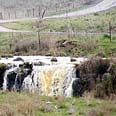
Water shortage looms in Israel after drought
Water Authority spokesman says population growth and improvement in quality of life leading to steep increase in water usage; soon-to-completed desalination plants expected to help deal with issue
Israel is suffering its greatest drought in the past decade and will have to stop pumping from one of its main drinking water sources by the end of the summer, an official said Wednesday.
Water Authority spokesman Uri Schor said when Israel has to stop pumping from the Sea of Galilee, where it gets about 40% of its drinking water, it will increase pumping from aquifiers that are already depleted.
"The situation is very, very bad," Schor said. "As we pump more from the aquifiers, the quality of the water will go down." Israel's water problem stems from population growth and an improvement in quality of life that brings a greater desire to water lawns and gardens, Schor said.
This winter was the fourth that Israel got less than average rain, with only about 50-60% of the average in most areas, he said.
Critics of government policy note that agriculture uses a large proportion of Israel's water, receiving heavily
subsidized water rates. Since Israel in any event does not grow much of the food it needs, they say, the sector should be drastically curtailed.
Israel's rainy winter season ends this month, though there can be occasional rainy days through June. The rainy season begins around October.
Despite the shortage, Israel will probably not reduce the amount of water supplied to Jordan according to the peace treaty between the countries, Schor said. Jordan's drought is much worse than Israel's, he said. Water is a contentious issue in the dry region, and one of the disputes Israeli and Palestinian negotiators hope to overcome in talks to work out a peace agreement.
In an effort to stem a serious shortage of water, Israel will launch a conservation campaign, targeting mostly household use. As part of the efforts, Israel has in recent weeks reduced by more than 50% the drinking water supplied to farmers, increasing their need for recycled water, Schor said.
Water officials will this weekend debate raising the cost of drinking water in another attempt to cut household use, he said.
Israel has two desalination plants that supply about one-third of water needed by municipalities and households, Schor said. Three other plants scheduled to be completed by 2013 will double that amount. The next one is due to be operational in next year.










